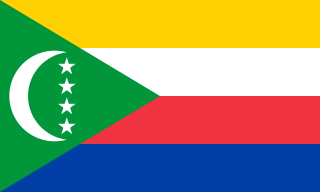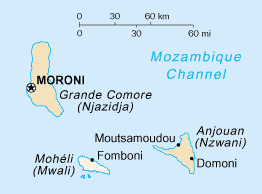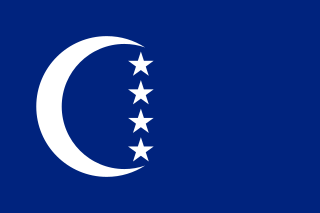| ||||||||||||||||||||||
| Results | ||||||||||||||||||||||
|---|---|---|---|---|---|---|---|---|---|---|---|---|---|---|---|---|---|---|---|---|---|---|
| ||||||||||||||||||||||
 |
|---|
|
A constitutional referendum was held in the Comoros on 23 December 2001. The proposed amendments to the constitution were approved by 77% of voters, with a turnout of 75.4%. [1]
| ||||||||||||||||||||||
| Results | ||||||||||||||||||||||
|---|---|---|---|---|---|---|---|---|---|---|---|---|---|---|---|---|---|---|---|---|---|---|
| ||||||||||||||||||||||
 |
|---|
|
A constitutional referendum was held in the Comoros on 23 December 2001. The proposed amendments to the constitution were approved by 77% of voters, with a turnout of 75.4%. [1]
The amendments to the constitution provided for a federal state, with a large degree of autonomy for the three islands Anjouan, Grande Comore and Mohéli, each of which would have their own president and legislature. The national presidency would rotate between the three islands. [1]
| Choice | Votes | % |
|---|---|---|
| For | 128,601 | 76.99 |
| Against | 38,433 | 23.01 |
| Invalid/blank votes | 6,487 | – |
| Total | 173,521 | 100 |
| Registered voters/turnout | 230,211 | 75.37 |
| Source: African Elections Database | ||

The Comoros, officially the Union of the Comoros, is an independent country made up of three islands in southeastern Africa, located at the northern end of the Mozambique Channel in the Indian Ocean. Its capital and largest city is Moroni. The religion of the majority of the population, and the official state religion, is Sunni Islam. As a member of the Arab League, it is the only country in the Arab world which is entirely in the Southern Hemisphere. Comoros proclaimed their independence on July 6, 1975. It is also a member state of the African Union, the Organisation internationale de la Francophonie, the Organisation of Islamic Cooperation, and the Indian Ocean Commission. The country has three official languages: Chi Comori, French and Arabic.

The Union of the Comoros consists of the three islands Njazidja, Mwali (Moheli) and Nzwani (Anjouan) while the island of Mayotte remains under French administration. The Politics of the Union of the Comoros take place in a framework of a federal presidential republic, whereby the President of the Comoros is both head of state and head of government, and of a multi-party system. Executive power is exercised by the government. Federal legislative power is vested in both the government and parliament. The precolonial legacies of the sultanates linger while the political situation in Comoros has been extremely fluid since the country's independence in 1975, subject to the volatility of coups and political insurrection.

Anjouan is an autonomous high island in the Indian Ocean that forms part of the Union of the Comoros. Its chief town is Mutsamudu and, as of 2006, its population is around 277,500. The total area of the island is 424 square kilometers.

Azali Assoumani is a Comorian politician and military officer who has served as President of the Comoros since April 2019. He was also president from 2002 to 2006 and 2016 to February 2019. He became head of state after staging a coup d'état in 1999 and was elected president in 2002, 2016 and April 2019.

The District of Columbia Voting Rights Amendment was a proposed amendment to the United States Constitution that would have given the District of Columbia full representation in the United States Congress, full representation in the Electoral College system, and full participation in the process by which the Constitution is amended. It would have also repealed the Twenty-third Amendment, which granted the District of Columbia the same number of electoral votes as that of the least populous state, but gave it no role in contingent elections.

Mohéli[mɔ.e.li], also known as Mwali, is an autonomous island that forms part of the Union of the Comoros. It is the smallest of the three major islands in the country. It is located in the Indian Ocean off the coast of Africa and it is the smallest of the four major Comoro Islands. Its capital and largest city is Fomboni.

Grande Comore is an island in Comoros off the coast of Africa. It is the largest island in the Comoros nation. Most of its population is of the Comorian ethnic group. Its population as of 2006 is about 316,600. The island's capital is Moroni, which is also the national capital. The island is made up of two shield volcanoes, with Mount Karthala being the country's highest point at 2,361 m (7,746 ft) above sea level. According to the 2009 revision of the constitution of 2002, it is governed by an elected Governor, as are the other islands, with the federal government being much reduced in power. The name Ngazidja is sometimes seen in the now nonstandard form Njazidja.

Elections in the Comoros take place within the framework of a multi-party democracy and a presidential system. The President and the majority of the seats in the Assembly of the Union are directly elected.

Presidential elections were held in the Comoros on 16 April and 14 May 2006. As it was the turn of the island of Anjouan to hold the union presidency, a primary election was held in Anjouan on 16 April, prior to a national election on 14 May. The result was a victory for Ahmed Abdallah Mohamed Sambi, who received 58% of the vote in the national election.
The Comoros is an island nation in the Indian Ocean, located off the eastern coast of Africa. France first established colonial rule in the Comoros in 1841. Agreement was reached with France in 1973 for the Comoros to become independent in 1978. On July 6, 1975, but the Comorian parliament passed a unilateral resolution declaring independence. The deputies of Mayotte, which remained under French control, abstained. Referendums on all four of the islands excluding Mayotte showed strong support for independence. Ahmed Abdallah proclaimed the Comoros' independence on September 5, 1975 and became its first president.

A constitutional referendum was held in the Comoros on 17 May 2009. The constitutional amendments were approved with 93.9% in favour, with a turnout of 51.8%.

An independence referendum was held in the Comoros on 22 December 1974. The overall result was a strong "yes" vote, with 94.57% of voters voting for independence and almost all the "no" votes being cast in Mayotte, where there was a majority for remaining under French control. In contrast, on Mohéli only five out of 6,059 votes were against independence. Voter turnout was 93.3%.

A constitutional referendum was held in the Comoros on 5 November 1989. The proposed amendments to the constitution would allow incumbent President Ahmed Abdallah to run for a third term, as well as creating the post of Prime Minister.

A constitutional referendum was held in the Comoros on 7 June 1992. The proposed amendments to the constitution were approved by 76% of voters, with voter turnout at around 64%.

A constitutional referendum was held in the Comoros on 20 October 1996. The proposed amendments would set the presidential term at 6 years, create a unicameral parliament, and limit the authority of the individual islands' parliaments. The proposals were approved by 85% of voters, with a turnout of around 64%.

Presidential elections were held in the Comoros in 2002. In accordance with the new constitution approved in a referendum the previous year, the island of Grande Comore was to provide the candidates for this election as part of a rotation agreement between the three islands. A first round was held on Grande Comore on 17 March, after which the top three candidates, Azali Assoumani, Mahamoud Mradabi and Saïd Ali Kemal went through to a second, national round of voting on 14 April. However, both Mradabi and Kemal boycotted the second round, leaving Assoumani as the only candidate.

The Constitution of the Comoros was adopted on 23 December 2001 and last amended in May 2009.

Early presidential elections were held in the Comoros on 24 March 2019 alongside regional elections. A second round would have been held on 21 April if required, but incumbent President Azali Assoumani was re-elected in the first round of voting.

Legislative elections were held in the Comoros on 19 January 2020; in constituencies where no candidate received a majority, a second round was held alongside local elections on 23 February. The elections were boycotted by the main opposition parties, including the two largest parties in the outgoing Assembly, the Union for the Development of the Comoros and Juwa Party, in protest at constitutional reform and political repression, The result was a landslide victory for President Azali Assoumani's Convention for the Renewal of the Comoros, which won 20 of the 24 elected seats.